Intel College: Organizational Behavior Report - Vivo Energy Analysis
VerifiedAdded on 2021/03/24
|45
|12536
|181
Report
AI Summary
This report provides a comprehensive analysis of organizational behavior within Vivo Energy. It begins by examining the influence of organizational culture, politics, and power on individual and team behavior and performance, referencing Charles Handy's theory of culture. The report then explores how content and process theories of motivation, including Herzberg's theory, Maslow's hierarchy, Vroom's expectancy theory, and goal-setting theory, along with motivational techniques, enable Vivo Energy to achieve its goals. Part B focuses on teamwork, differentiating between effective and ineffective teams, and analyzes relevant team and group development theories. The report further applies and evaluates how organizational behavior concepts and philosophies inform and influence behavior within a business situation, including a discussion of leadership theories like Theory X and Theory Y and contingency theory. The report concludes with a bibliography of cited sources.
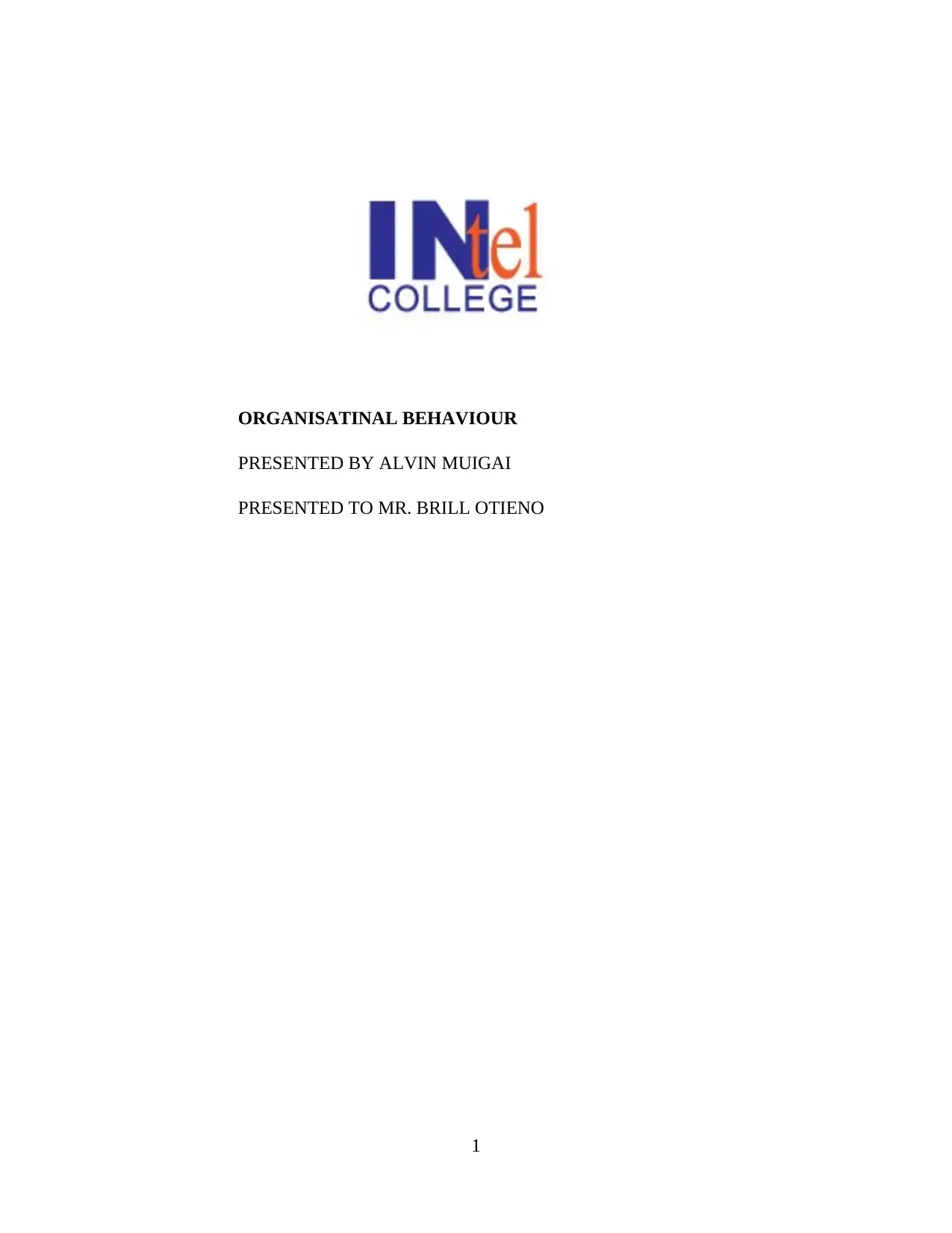
ORGANISATINAL BEHAVIOUR
PRESENTED BY ALVIN MUIGAI
PRESENTED TO MR. BRILL OTIENO
1
PRESENTED BY ALVIN MUIGAI
PRESENTED TO MR. BRILL OTIENO
1
Paraphrase This Document
Need a fresh take? Get an instant paraphrase of this document with our AI Paraphraser
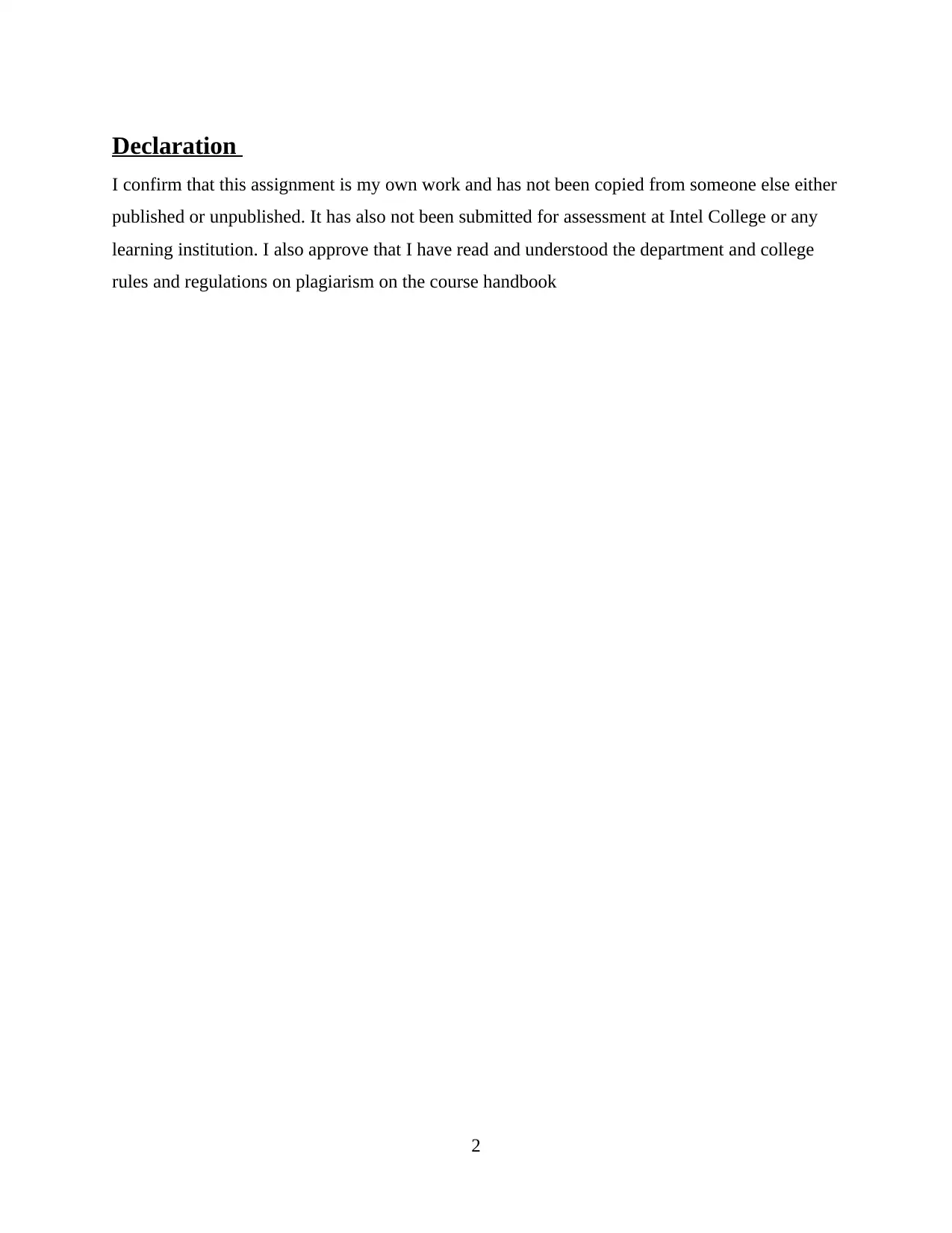
Declaration
I confirm that this assignment is my own work and has not been copied from someone else either
published or unpublished. It has also not been submitted for assessment at Intel College or any
learning institution. I also approve that I have read and understood the department and college
rules and regulations on plagiarism on the course handbook
2
I confirm that this assignment is my own work and has not been copied from someone else either
published or unpublished. It has also not been submitted for assessment at Intel College or any
learning institution. I also approve that I have read and understood the department and college
rules and regulations on plagiarism on the course handbook
2
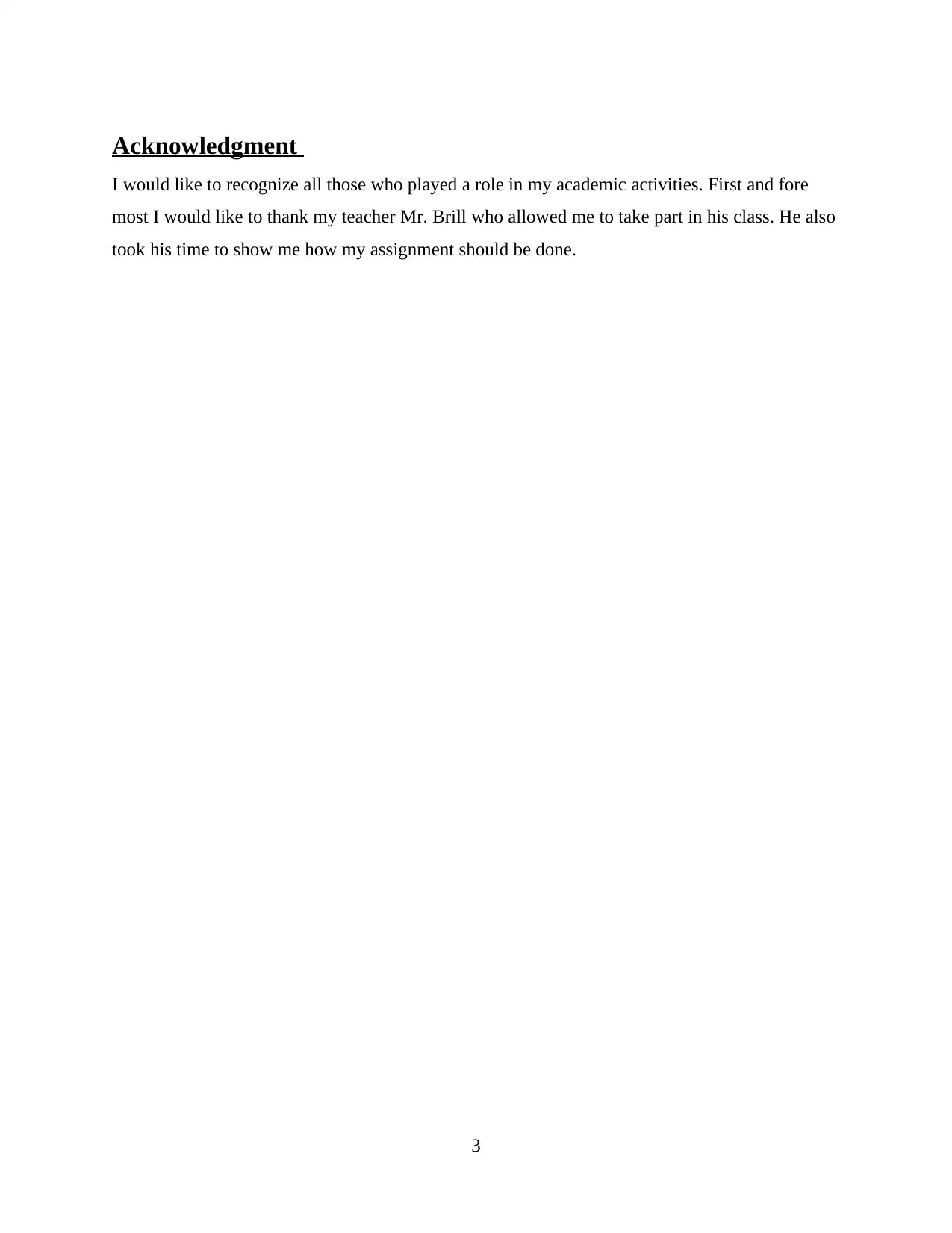
Acknowledgment
I would like to recognize all those who played a role in my academic activities. First and fore
most I would like to thank my teacher Mr. Brill who allowed me to take part in his class. He also
took his time to show me how my assignment should be done.
3
I would like to recognize all those who played a role in my academic activities. First and fore
most I would like to thank my teacher Mr. Brill who allowed me to take part in his class. He also
took his time to show me how my assignment should be done.
3
⊘ This is a preview!⊘
Do you want full access?
Subscribe today to unlock all pages.

Trusted by 1+ million students worldwide
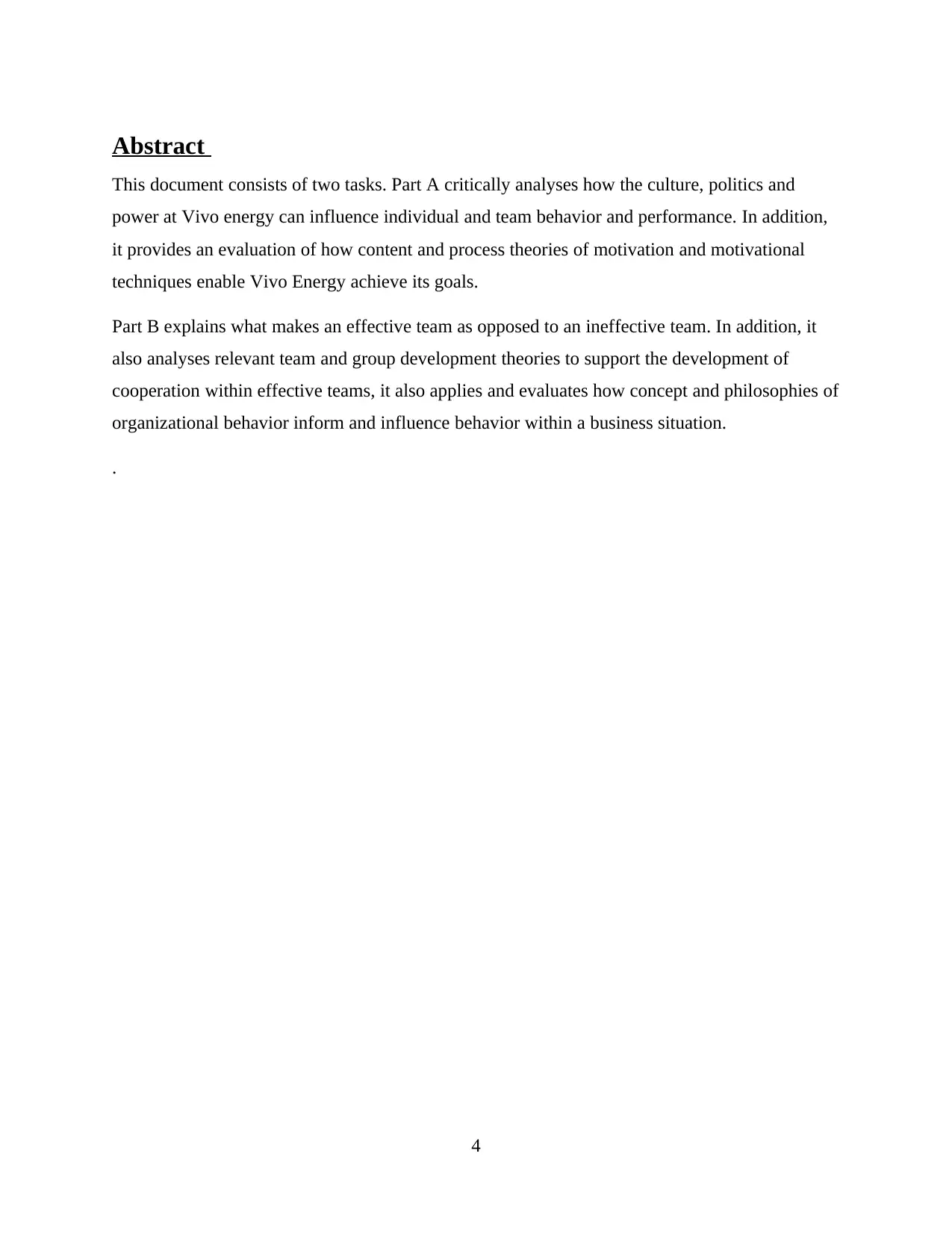
Abstract
This document consists of two tasks. Part A critically analyses how the culture, politics and
power at Vivo energy can influence individual and team behavior and performance. In addition,
it provides an evaluation of how content and process theories of motivation and motivational
techniques enable Vivo Energy achieve its goals.
Part B explains what makes an effective team as opposed to an ineffective team. In addition, it
also analyses relevant team and group development theories to support the development of
cooperation within effective teams, it also applies and evaluates how concept and philosophies of
organizational behavior inform and influence behavior within a business situation.
.
4
This document consists of two tasks. Part A critically analyses how the culture, politics and
power at Vivo energy can influence individual and team behavior and performance. In addition,
it provides an evaluation of how content and process theories of motivation and motivational
techniques enable Vivo Energy achieve its goals.
Part B explains what makes an effective team as opposed to an ineffective team. In addition, it
also analyses relevant team and group development theories to support the development of
cooperation within effective teams, it also applies and evaluates how concept and philosophies of
organizational behavior inform and influence behavior within a business situation.
.
4
Paraphrase This Document
Need a fresh take? Get an instant paraphrase of this document with our AI Paraphraser

5
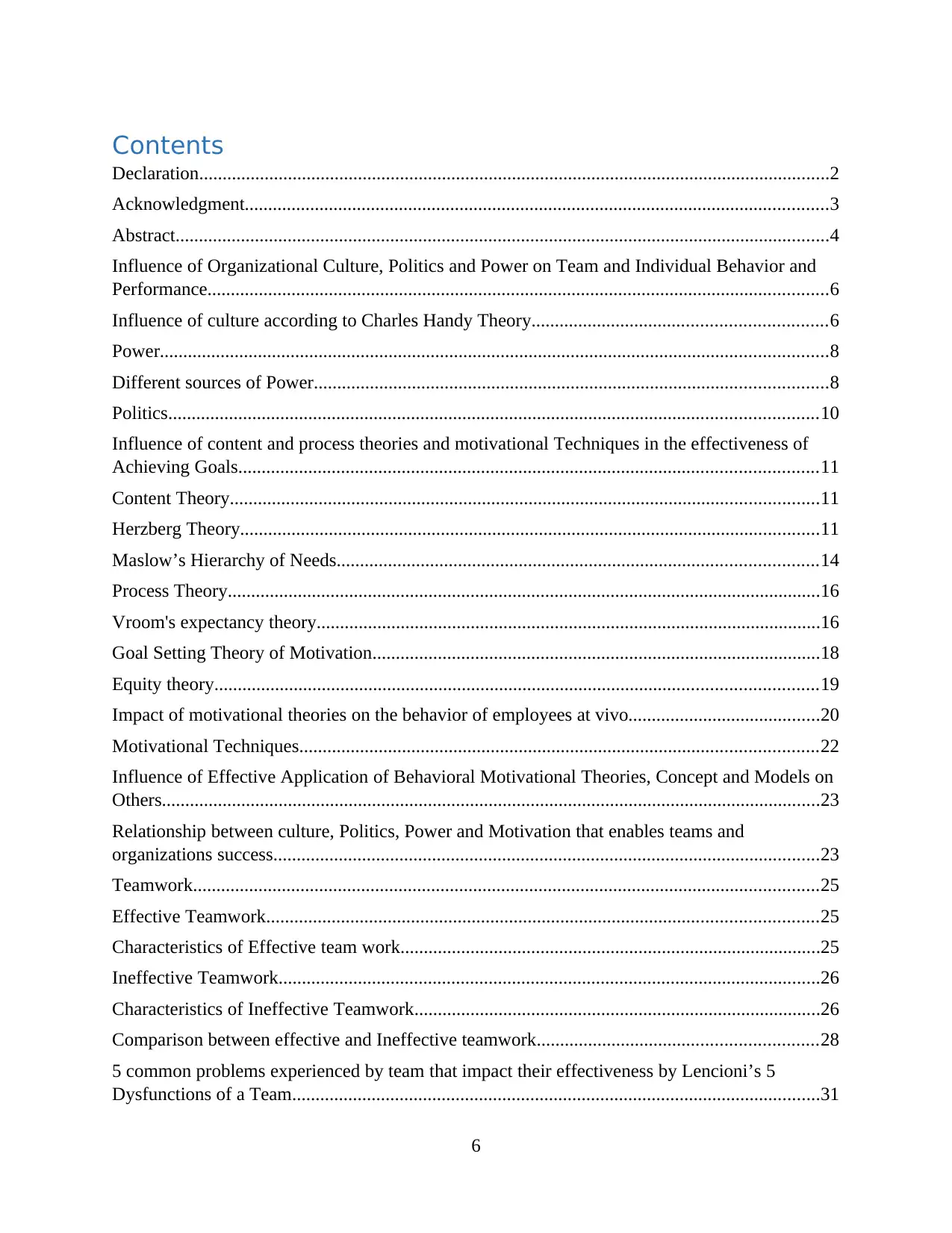
Contents
Declaration.......................................................................................................................................2
Acknowledgment.............................................................................................................................3
Abstract............................................................................................................................................4
Influence of Organizational Culture, Politics and Power on Team and Individual Behavior and
Performance.....................................................................................................................................6
Influence of culture according to Charles Handy Theory...............................................................6
Power...............................................................................................................................................8
Different sources of Power..............................................................................................................8
Politics...........................................................................................................................................10
Influence of content and process theories and motivational Techniques in the effectiveness of
Achieving Goals............................................................................................................................11
Content Theory..............................................................................................................................11
Herzberg Theory............................................................................................................................11
Maslow’s Hierarchy of Needs.......................................................................................................14
Process Theory...............................................................................................................................16
Vroom's expectancy theory............................................................................................................16
Goal Setting Theory of Motivation................................................................................................18
Equity theory.................................................................................................................................19
Impact of motivational theories on the behavior of employees at vivo.........................................20
Motivational Techniques...............................................................................................................22
Influence of Effective Application of Behavioral Motivational Theories, Concept and Models on
Others.............................................................................................................................................23
Relationship between culture, Politics, Power and Motivation that enables teams and
organizations success.....................................................................................................................23
Teamwork......................................................................................................................................25
Effective Teamwork......................................................................................................................25
Characteristics of Effective team work..........................................................................................25
Ineffective Teamwork....................................................................................................................26
Characteristics of Ineffective Teamwork.......................................................................................26
Comparison between effective and Ineffective teamwork............................................................28
5 common problems experienced by team that impact their effectiveness by Lencioni’s 5
Dysfunctions of a Team.................................................................................................................31
6
Declaration.......................................................................................................................................2
Acknowledgment.............................................................................................................................3
Abstract............................................................................................................................................4
Influence of Organizational Culture, Politics and Power on Team and Individual Behavior and
Performance.....................................................................................................................................6
Influence of culture according to Charles Handy Theory...............................................................6
Power...............................................................................................................................................8
Different sources of Power..............................................................................................................8
Politics...........................................................................................................................................10
Influence of content and process theories and motivational Techniques in the effectiveness of
Achieving Goals............................................................................................................................11
Content Theory..............................................................................................................................11
Herzberg Theory............................................................................................................................11
Maslow’s Hierarchy of Needs.......................................................................................................14
Process Theory...............................................................................................................................16
Vroom's expectancy theory............................................................................................................16
Goal Setting Theory of Motivation................................................................................................18
Equity theory.................................................................................................................................19
Impact of motivational theories on the behavior of employees at vivo.........................................20
Motivational Techniques...............................................................................................................22
Influence of Effective Application of Behavioral Motivational Theories, Concept and Models on
Others.............................................................................................................................................23
Relationship between culture, Politics, Power and Motivation that enables teams and
organizations success.....................................................................................................................23
Teamwork......................................................................................................................................25
Effective Teamwork......................................................................................................................25
Characteristics of Effective team work..........................................................................................25
Ineffective Teamwork....................................................................................................................26
Characteristics of Ineffective Teamwork.......................................................................................26
Comparison between effective and Ineffective teamwork............................................................28
5 common problems experienced by team that impact their effectiveness by Lencioni’s 5
Dysfunctions of a Team.................................................................................................................31
6
⊘ This is a preview!⊘
Do you want full access?
Subscribe today to unlock all pages.

Trusted by 1+ million students worldwide
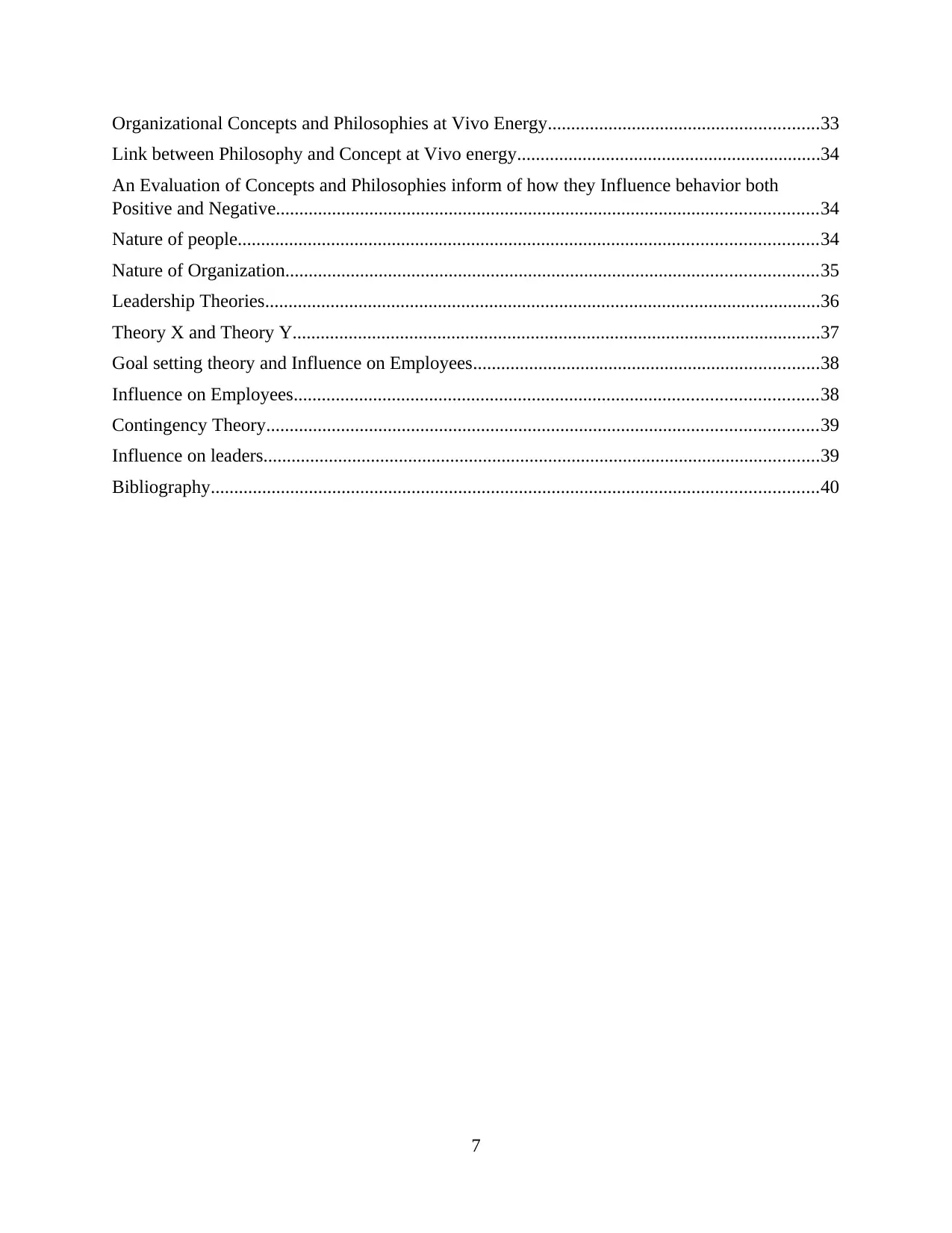
Organizational Concepts and Philosophies at Vivo Energy..........................................................33
Link between Philosophy and Concept at Vivo energy.................................................................34
An Evaluation of Concepts and Philosophies inform of how they Influence behavior both
Positive and Negative....................................................................................................................34
Nature of people............................................................................................................................34
Nature of Organization..................................................................................................................35
Leadership Theories.......................................................................................................................36
Theory X and Theory Y.................................................................................................................37
Goal setting theory and Influence on Employees..........................................................................38
Influence on Employees................................................................................................................38
Contingency Theory......................................................................................................................39
Influence on leaders.......................................................................................................................39
Bibliography..................................................................................................................................40
7
Link between Philosophy and Concept at Vivo energy.................................................................34
An Evaluation of Concepts and Philosophies inform of how they Influence behavior both
Positive and Negative....................................................................................................................34
Nature of people............................................................................................................................34
Nature of Organization..................................................................................................................35
Leadership Theories.......................................................................................................................36
Theory X and Theory Y.................................................................................................................37
Goal setting theory and Influence on Employees..........................................................................38
Influence on Employees................................................................................................................38
Contingency Theory......................................................................................................................39
Influence on leaders.......................................................................................................................39
Bibliography..................................................................................................................................40
7
Paraphrase This Document
Need a fresh take? Get an instant paraphrase of this document with our AI Paraphraser
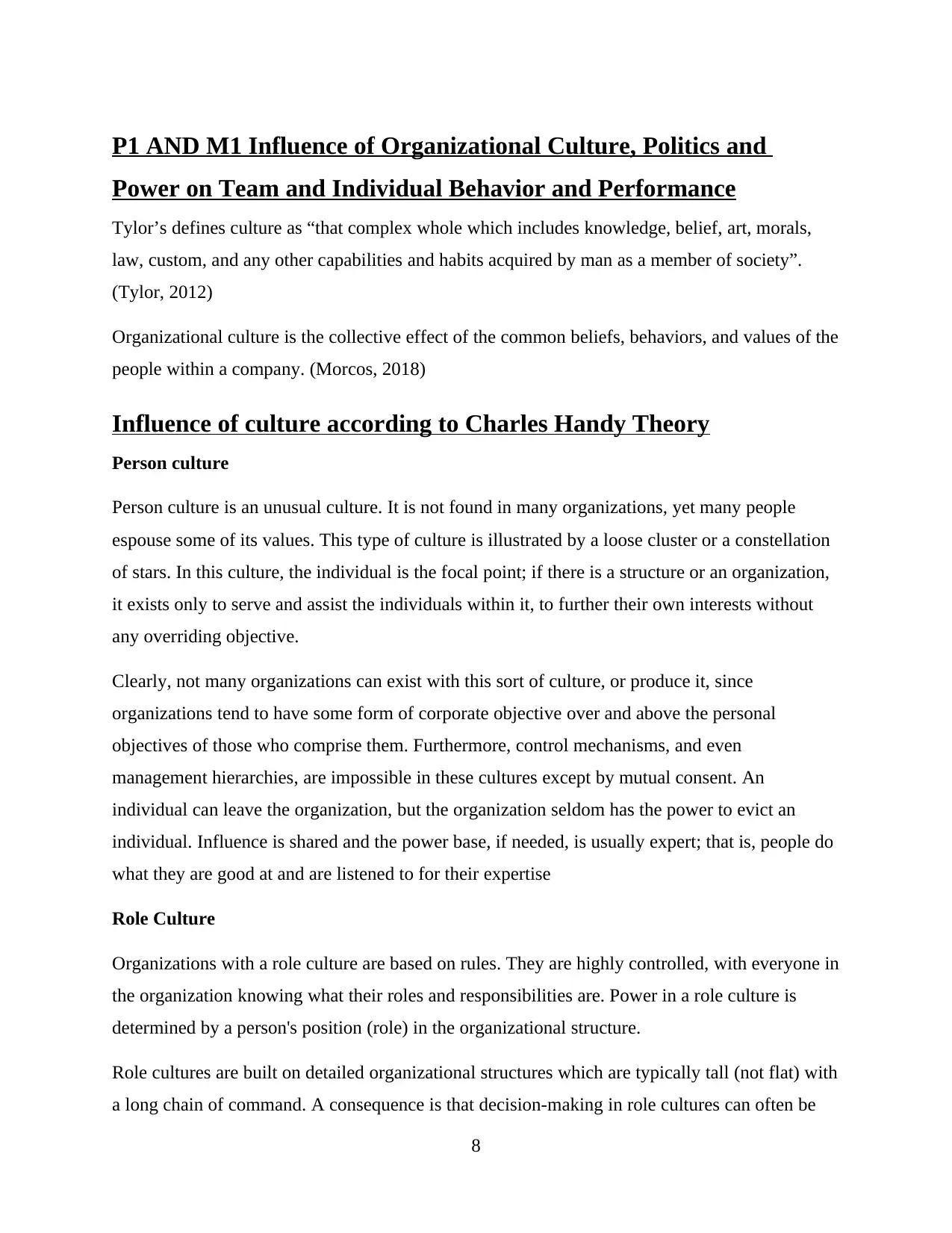
P1 AND M1 Influence of Organizational Culture, Politics and
Power on Team and Individual Behavior and Performance
Tylor’s defines culture as “that complex whole which includes knowledge, belief, art, morals,
law, custom, and any other capabilities and habits acquired by man as a member of society”.
(Tylor, 2012)
Organizational culture is the collective effect of the common beliefs, behaviors, and values of the
people within a company. (Morcos, 2018)
Influence of culture according to Charles Handy Theory
Person culture
Person culture is an unusual culture. It is not found in many organizations, yet many people
espouse some of its values. This type of culture is illustrated by a loose cluster or a constellation
of stars. In this culture, the individual is the focal point; if there is a structure or an organization,
it exists only to serve and assist the individuals within it, to further their own interests without
any overriding objective.
Clearly, not many organizations can exist with this sort of culture, or produce it, since
organizations tend to have some form of corporate objective over and above the personal
objectives of those who comprise them. Furthermore, control mechanisms, and even
management hierarchies, are impossible in these cultures except by mutual consent. An
individual can leave the organization, but the organization seldom has the power to evict an
individual. Influence is shared and the power base, if needed, is usually expert; that is, people do
what they are good at and are listened to for their expertise
Role Culture
Organizations with a role culture are based on rules. They are highly controlled, with everyone in
the organization knowing what their roles and responsibilities are. Power in a role culture is
determined by a person's position (role) in the organizational structure.
Role cultures are built on detailed organizational structures which are typically tall (not flat) with
a long chain of command. A consequence is that decision-making in role cultures can often be
8
Power on Team and Individual Behavior and Performance
Tylor’s defines culture as “that complex whole which includes knowledge, belief, art, morals,
law, custom, and any other capabilities and habits acquired by man as a member of society”.
(Tylor, 2012)
Organizational culture is the collective effect of the common beliefs, behaviors, and values of the
people within a company. (Morcos, 2018)
Influence of culture according to Charles Handy Theory
Person culture
Person culture is an unusual culture. It is not found in many organizations, yet many people
espouse some of its values. This type of culture is illustrated by a loose cluster or a constellation
of stars. In this culture, the individual is the focal point; if there is a structure or an organization,
it exists only to serve and assist the individuals within it, to further their own interests without
any overriding objective.
Clearly, not many organizations can exist with this sort of culture, or produce it, since
organizations tend to have some form of corporate objective over and above the personal
objectives of those who comprise them. Furthermore, control mechanisms, and even
management hierarchies, are impossible in these cultures except by mutual consent. An
individual can leave the organization, but the organization seldom has the power to evict an
individual. Influence is shared and the power base, if needed, is usually expert; that is, people do
what they are good at and are listened to for their expertise
Role Culture
Organizations with a role culture are based on rules. They are highly controlled, with everyone in
the organization knowing what their roles and responsibilities are. Power in a role culture is
determined by a person's position (role) in the organizational structure.
Role cultures are built on detailed organizational structures which are typically tall (not flat) with
a long chain of command. A consequence is that decision-making in role cultures can often be
8
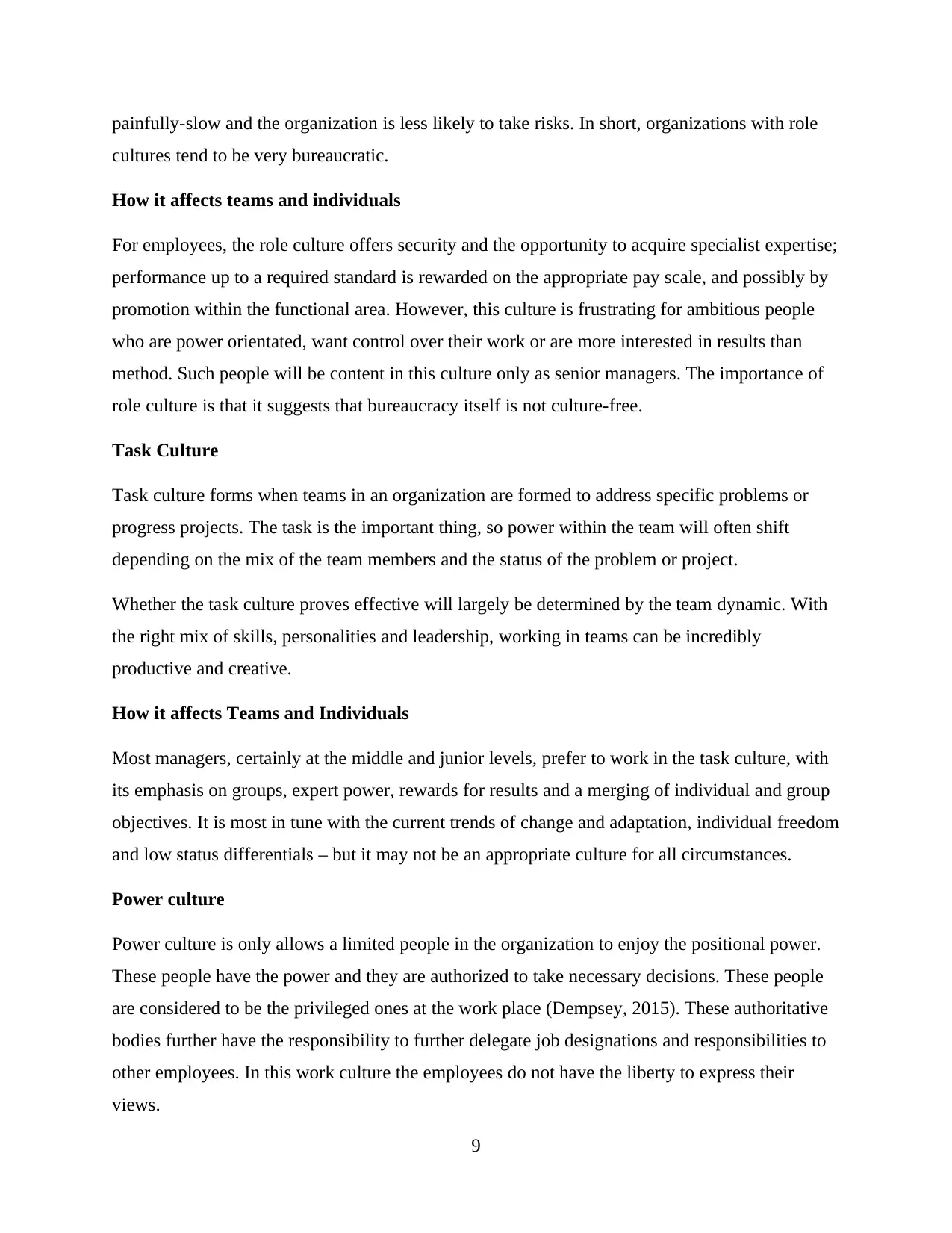
painfully-slow and the organization is less likely to take risks. In short, organizations with role
cultures tend to be very bureaucratic.
How it affects teams and individuals
For employees, the role culture offers security and the opportunity to acquire specialist expertise;
performance up to a required standard is rewarded on the appropriate pay scale, and possibly by
promotion within the functional area. However, this culture is frustrating for ambitious people
who are power orientated, want control over their work or are more interested in results than
method. Such people will be content in this culture only as senior managers. The importance of
role culture is that it suggests that bureaucracy itself is not culture-free.
Task Culture
Task culture forms when teams in an organization are formed to address specific problems or
progress projects. The task is the important thing, so power within the team will often shift
depending on the mix of the team members and the status of the problem or project.
Whether the task culture proves effective will largely be determined by the team dynamic. With
the right mix of skills, personalities and leadership, working in teams can be incredibly
productive and creative.
How it affects Teams and Individuals
Most managers, certainly at the middle and junior levels, prefer to work in the task culture, with
its emphasis on groups, expert power, rewards for results and a merging of individual and group
objectives. It is most in tune with the current trends of change and adaptation, individual freedom
and low status differentials – but it may not be an appropriate culture for all circumstances.
Power culture
Power culture is only allows a limited people in the organization to enjoy the positional power.
These people have the power and they are authorized to take necessary decisions. These people
are considered to be the privileged ones at the work place (Dempsey, 2015). These authoritative
bodies further have the responsibility to further delegate job designations and responsibilities to
other employees. In this work culture the employees do not have the liberty to express their
views.
9
cultures tend to be very bureaucratic.
How it affects teams and individuals
For employees, the role culture offers security and the opportunity to acquire specialist expertise;
performance up to a required standard is rewarded on the appropriate pay scale, and possibly by
promotion within the functional area. However, this culture is frustrating for ambitious people
who are power orientated, want control over their work or are more interested in results than
method. Such people will be content in this culture only as senior managers. The importance of
role culture is that it suggests that bureaucracy itself is not culture-free.
Task Culture
Task culture forms when teams in an organization are formed to address specific problems or
progress projects. The task is the important thing, so power within the team will often shift
depending on the mix of the team members and the status of the problem or project.
Whether the task culture proves effective will largely be determined by the team dynamic. With
the right mix of skills, personalities and leadership, working in teams can be incredibly
productive and creative.
How it affects Teams and Individuals
Most managers, certainly at the middle and junior levels, prefer to work in the task culture, with
its emphasis on groups, expert power, rewards for results and a merging of individual and group
objectives. It is most in tune with the current trends of change and adaptation, individual freedom
and low status differentials – but it may not be an appropriate culture for all circumstances.
Power culture
Power culture is only allows a limited people in the organization to enjoy the positional power.
These people have the power and they are authorized to take necessary decisions. These people
are considered to be the privileged ones at the work place (Dempsey, 2015). These authoritative
bodies further have the responsibility to further delegate job designations and responsibilities to
other employees. In this work culture the employees do not have the liberty to express their
views.
9
⊘ This is a preview!⊘
Do you want full access?
Subscribe today to unlock all pages.

Trusted by 1+ million students worldwide
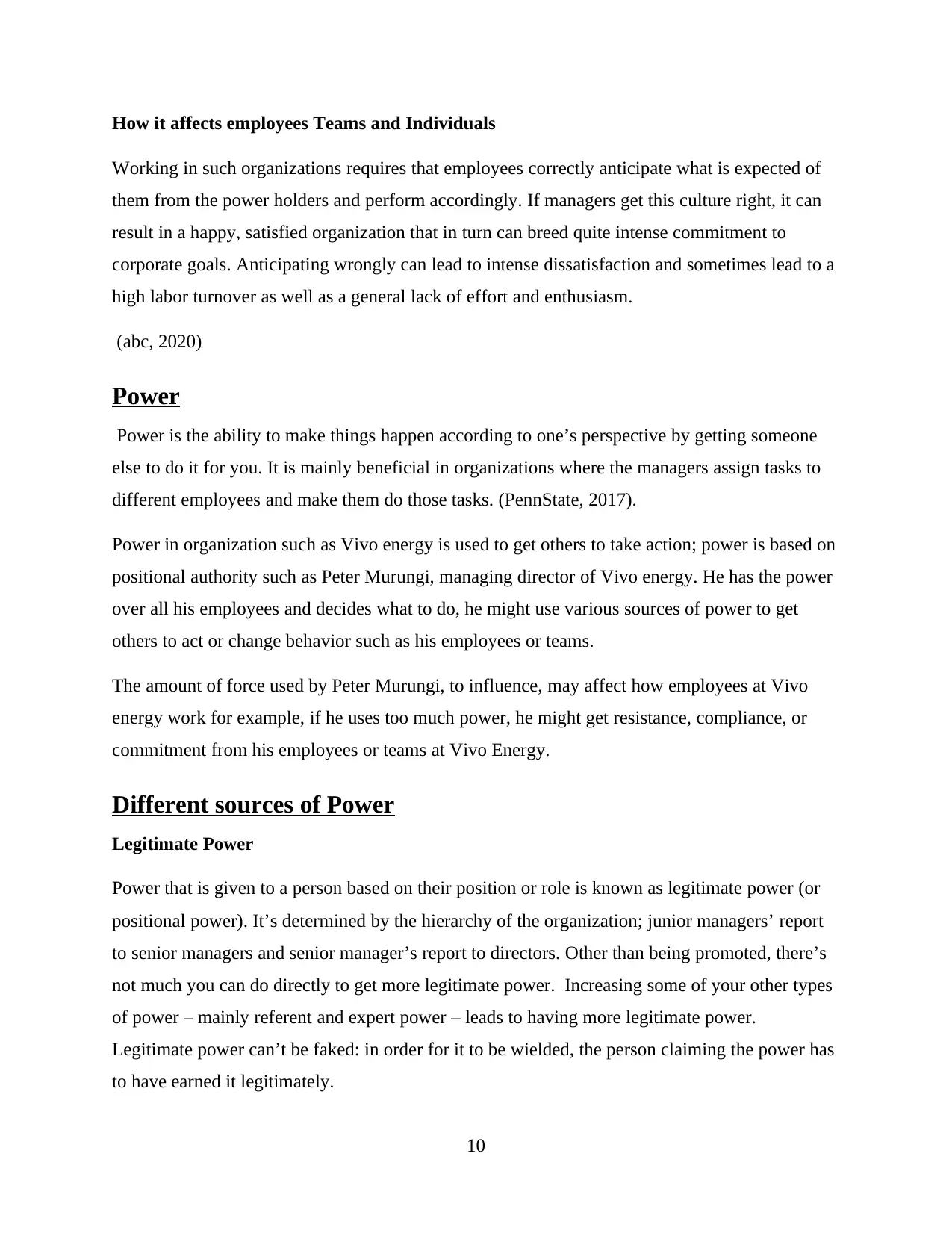
How it affects employees Teams and Individuals
Working in such organizations requires that employees correctly anticipate what is expected of
them from the power holders and perform accordingly. If managers get this culture right, it can
result in a happy, satisfied organization that in turn can breed quite intense commitment to
corporate goals. Anticipating wrongly can lead to intense dissatisfaction and sometimes lead to a
high labor turnover as well as a general lack of effort and enthusiasm.
(abc, 2020)
Power
Power is the ability to make things happen according to one’s perspective by getting someone
else to do it for you. It is mainly beneficial in organizations where the managers assign tasks to
different employees and make them do those tasks. (PennState, 2017).
Power in organization such as Vivo energy is used to get others to take action; power is based on
positional authority such as Peter Murungi, managing director of Vivo energy. He has the power
over all his employees and decides what to do, he might use various sources of power to get
others to act or change behavior such as his employees or teams.
The amount of force used by Peter Murungi, to influence, may affect how employees at Vivo
energy work for example, if he uses too much power, he might get resistance, compliance, or
commitment from his employees or teams at Vivo Energy.
Different sources of Power
Legitimate Power
Power that is given to a person based on their position or role is known as legitimate power (or
positional power). It’s determined by the hierarchy of the organization; junior managers’ report
to senior managers and senior manager’s report to directors. Other than being promoted, there’s
not much you can do directly to get more legitimate power. Increasing some of your other types
of power – mainly referent and expert power – leads to having more legitimate power.
Legitimate power can’t be faked: in order for it to be wielded, the person claiming the power has
to have earned it legitimately.
10
Working in such organizations requires that employees correctly anticipate what is expected of
them from the power holders and perform accordingly. If managers get this culture right, it can
result in a happy, satisfied organization that in turn can breed quite intense commitment to
corporate goals. Anticipating wrongly can lead to intense dissatisfaction and sometimes lead to a
high labor turnover as well as a general lack of effort and enthusiasm.
(abc, 2020)
Power
Power is the ability to make things happen according to one’s perspective by getting someone
else to do it for you. It is mainly beneficial in organizations where the managers assign tasks to
different employees and make them do those tasks. (PennState, 2017).
Power in organization such as Vivo energy is used to get others to take action; power is based on
positional authority such as Peter Murungi, managing director of Vivo energy. He has the power
over all his employees and decides what to do, he might use various sources of power to get
others to act or change behavior such as his employees or teams.
The amount of force used by Peter Murungi, to influence, may affect how employees at Vivo
energy work for example, if he uses too much power, he might get resistance, compliance, or
commitment from his employees or teams at Vivo Energy.
Different sources of Power
Legitimate Power
Power that is given to a person based on their position or role is known as legitimate power (or
positional power). It’s determined by the hierarchy of the organization; junior managers’ report
to senior managers and senior manager’s report to directors. Other than being promoted, there’s
not much you can do directly to get more legitimate power. Increasing some of your other types
of power – mainly referent and expert power – leads to having more legitimate power.
Legitimate power can’t be faked: in order for it to be wielded, the person claiming the power has
to have earned it legitimately.
10
Paraphrase This Document
Need a fresh take? Get an instant paraphrase of this document with our AI Paraphraser
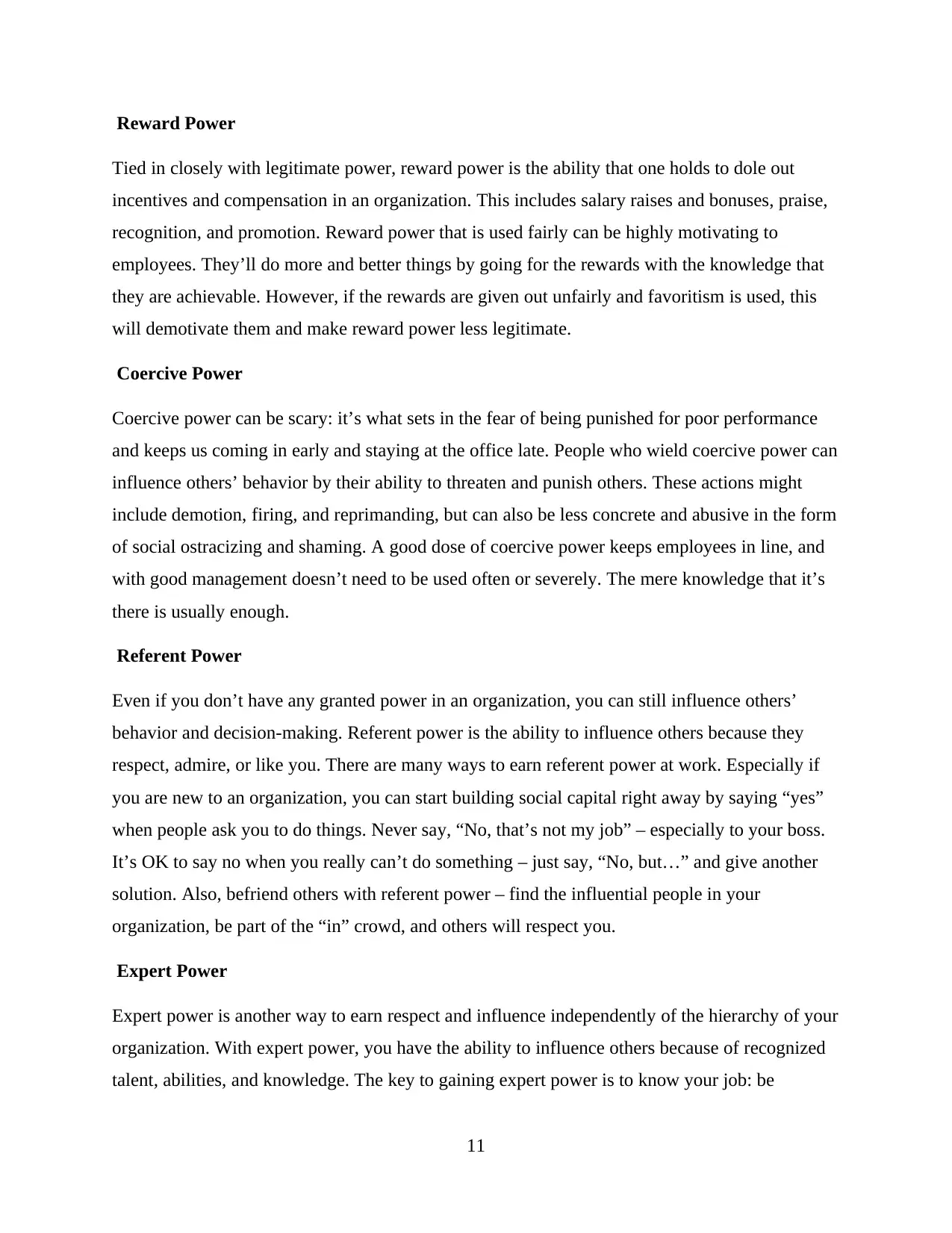
Reward Power
Tied in closely with legitimate power, reward power is the ability that one holds to dole out
incentives and compensation in an organization. This includes salary raises and bonuses, praise,
recognition, and promotion. Reward power that is used fairly can be highly motivating to
employees. They’ll do more and better things by going for the rewards with the knowledge that
they are achievable. However, if the rewards are given out unfairly and favoritism is used, this
will demotivate them and make reward power less legitimate.
Coercive Power
Coercive power can be scary: it’s what sets in the fear of being punished for poor performance
and keeps us coming in early and staying at the office late. People who wield coercive power can
influence others’ behavior by their ability to threaten and punish others. These actions might
include demotion, firing, and reprimanding, but can also be less concrete and abusive in the form
of social ostracizing and shaming. A good dose of coercive power keeps employees in line, and
with good management doesn’t need to be used often or severely. The mere knowledge that it’s
there is usually enough.
Referent Power
Even if you don’t have any granted power in an organization, you can still influence others’
behavior and decision-making. Referent power is the ability to influence others because they
respect, admire, or like you. There are many ways to earn referent power at work. Especially if
you are new to an organization, you can start building social capital right away by saying “yes”
when people ask you to do things. Never say, “No, that’s not my job” – especially to your boss.
It’s OK to say no when you really can’t do something – just say, “No, but…” and give another
solution. Also, befriend others with referent power – find the influential people in your
organization, be part of the “in” crowd, and others will respect you.
Expert Power
Expert power is another way to earn respect and influence independently of the hierarchy of your
organization. With expert power, you have the ability to influence others because of recognized
talent, abilities, and knowledge. The key to gaining expert power is to know your job: be
11
Tied in closely with legitimate power, reward power is the ability that one holds to dole out
incentives and compensation in an organization. This includes salary raises and bonuses, praise,
recognition, and promotion. Reward power that is used fairly can be highly motivating to
employees. They’ll do more and better things by going for the rewards with the knowledge that
they are achievable. However, if the rewards are given out unfairly and favoritism is used, this
will demotivate them and make reward power less legitimate.
Coercive Power
Coercive power can be scary: it’s what sets in the fear of being punished for poor performance
and keeps us coming in early and staying at the office late. People who wield coercive power can
influence others’ behavior by their ability to threaten and punish others. These actions might
include demotion, firing, and reprimanding, but can also be less concrete and abusive in the form
of social ostracizing and shaming. A good dose of coercive power keeps employees in line, and
with good management doesn’t need to be used often or severely. The mere knowledge that it’s
there is usually enough.
Referent Power
Even if you don’t have any granted power in an organization, you can still influence others’
behavior and decision-making. Referent power is the ability to influence others because they
respect, admire, or like you. There are many ways to earn referent power at work. Especially if
you are new to an organization, you can start building social capital right away by saying “yes”
when people ask you to do things. Never say, “No, that’s not my job” – especially to your boss.
It’s OK to say no when you really can’t do something – just say, “No, but…” and give another
solution. Also, befriend others with referent power – find the influential people in your
organization, be part of the “in” crowd, and others will respect you.
Expert Power
Expert power is another way to earn respect and influence independently of the hierarchy of your
organization. With expert power, you have the ability to influence others because of recognized
talent, abilities, and knowledge. The key to gaining expert power is to know your job: be
11
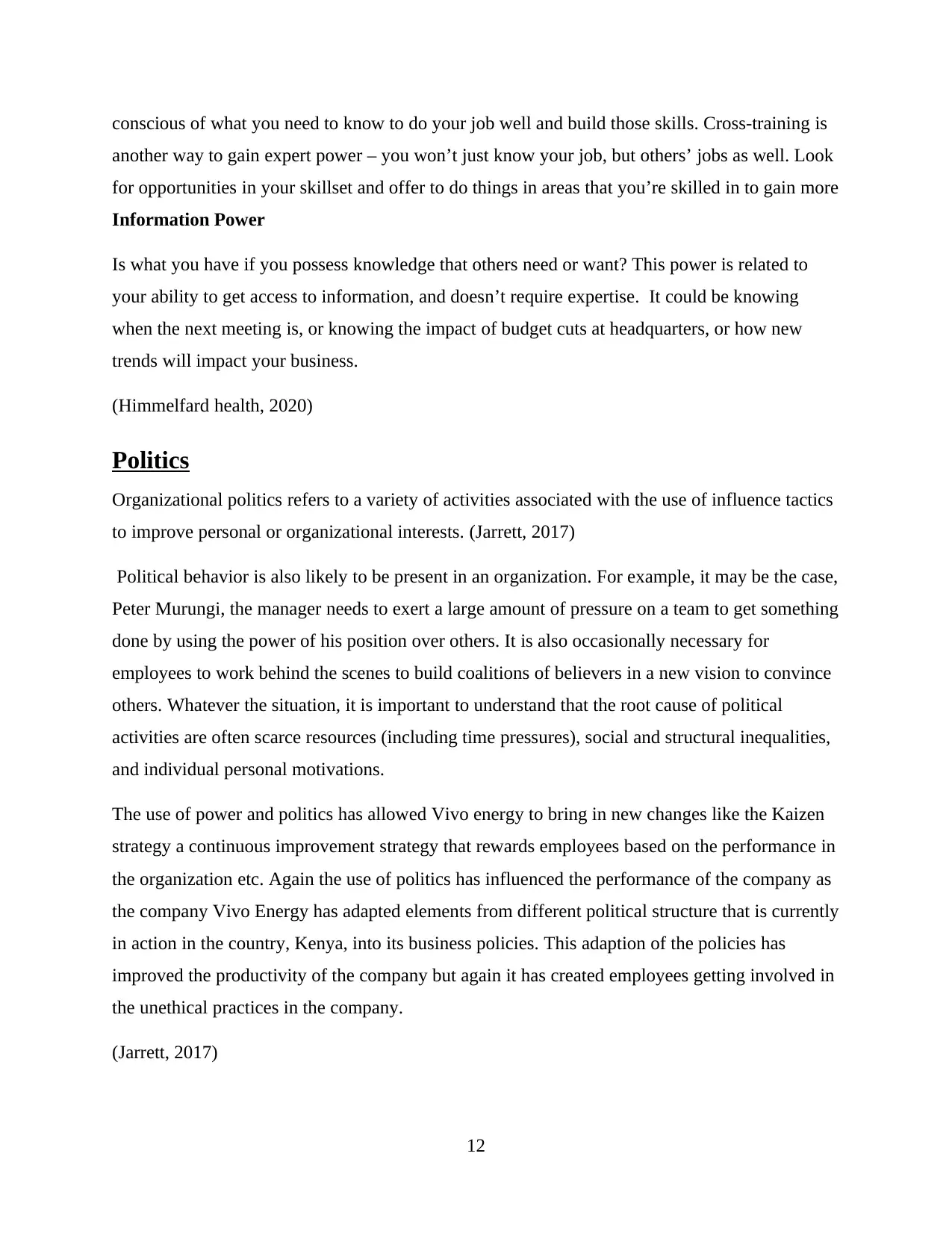
conscious of what you need to know to do your job well and build those skills. Cross-training is
another way to gain expert power – you won’t just know your job, but others’ jobs as well. Look
for opportunities in your skillset and offer to do things in areas that you’re skilled in to gain more
Information Power
Is what you have if you possess knowledge that others need or want? This power is related to
your ability to get access to information, and doesn’t require expertise. It could be knowing
when the next meeting is, or knowing the impact of budget cuts at headquarters, or how new
trends will impact your business.
(Himmelfard health, 2020)
Politics
Organizational politics refers to a variety of activities associated with the use of influence tactics
to improve personal or organizational interests. (Jarrett, 2017)
Political behavior is also likely to be present in an organization. For example, it may be the case,
Peter Murungi, the manager needs to exert a large amount of pressure on a team to get something
done by using the power of his position over others. It is also occasionally necessary for
employees to work behind the scenes to build coalitions of believers in a new vision to convince
others. Whatever the situation, it is important to understand that the root cause of political
activities are often scarce resources (including time pressures), social and structural inequalities,
and individual personal motivations.
The use of power and politics has allowed Vivo energy to bring in new changes like the Kaizen
strategy a continuous improvement strategy that rewards employees based on the performance in
the organization etc. Again the use of politics has influenced the performance of the company as
the company Vivo Energy has adapted elements from different political structure that is currently
in action in the country, Kenya, into its business policies. This adaption of the policies has
improved the productivity of the company but again it has created employees getting involved in
the unethical practices in the company.
(Jarrett, 2017)
12
another way to gain expert power – you won’t just know your job, but others’ jobs as well. Look
for opportunities in your skillset and offer to do things in areas that you’re skilled in to gain more
Information Power
Is what you have if you possess knowledge that others need or want? This power is related to
your ability to get access to information, and doesn’t require expertise. It could be knowing
when the next meeting is, or knowing the impact of budget cuts at headquarters, or how new
trends will impact your business.
(Himmelfard health, 2020)
Politics
Organizational politics refers to a variety of activities associated with the use of influence tactics
to improve personal or organizational interests. (Jarrett, 2017)
Political behavior is also likely to be present in an organization. For example, it may be the case,
Peter Murungi, the manager needs to exert a large amount of pressure on a team to get something
done by using the power of his position over others. It is also occasionally necessary for
employees to work behind the scenes to build coalitions of believers in a new vision to convince
others. Whatever the situation, it is important to understand that the root cause of political
activities are often scarce resources (including time pressures), social and structural inequalities,
and individual personal motivations.
The use of power and politics has allowed Vivo energy to bring in new changes like the Kaizen
strategy a continuous improvement strategy that rewards employees based on the performance in
the organization etc. Again the use of politics has influenced the performance of the company as
the company Vivo Energy has adapted elements from different political structure that is currently
in action in the country, Kenya, into its business policies. This adaption of the policies has
improved the productivity of the company but again it has created employees getting involved in
the unethical practices in the company.
(Jarrett, 2017)
12
⊘ This is a preview!⊘
Do you want full access?
Subscribe today to unlock all pages.

Trusted by 1+ million students worldwide
1 out of 45
Related Documents
Your All-in-One AI-Powered Toolkit for Academic Success.
+13062052269
info@desklib.com
Available 24*7 on WhatsApp / Email
![[object Object]](/_next/static/media/star-bottom.7253800d.svg)
Unlock your academic potential
Copyright © 2020–2026 A2Z Services. All Rights Reserved. Developed and managed by ZUCOL.




